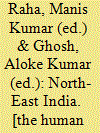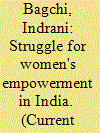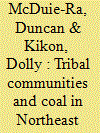| Srl | Item |
| 1 |
ID:
183179


|
|
|
|
|
| Summary/Abstract |
This article is based on field research investigating levels of ecoliteracy and associating factors among four tribal groups in Jharkhand and West Bengal, involving 360 respondents from the Lodha, Santhal, Asur and Oraon communities. The study revealed low to extremely high levels of ecoliteracy and identified several specific factors as significant predictors of ecoliteracy levels. While gender, occupation and total monthly income of respondents did not influence such levels, the study conclusively indicates that detachment from forest and natural resources is detrimental to the preservation and cultivation of ecoliteracy and that the connection of people and forests requires careful multidimensional attention.
|
|
|
|
|
|
|
|
|
|
|
|
|
|
|
|
| 2 |
ID:
000461


|
|
|
|
|
| Publication |
New Delhi, Gyan Publishing House, 1998.
|
| Description |
469p.hbk
|
| Series |
Anthropology, Sociology, Behavioural Sciences, Regional Studies
|
| Standard Number |
8121205735
|
|
|
|
|
|
|
|
|
|
|
|
Copies: C:1/I:0,R:0,Q:0
Circulation
| Accession# | Call# | Current Location | Status | Policy | Location |
| 041785 | 954.1/RAH 041785 | Main | On Shelf | General | |
|
|
|
|
| 3 |
ID:
129651


|
|
|
|
|
| Publication |
2014.
|
| Summary/Abstract |
The young woman was caught by tribal elders of the village, apparently in the company of a Muslim man. She was no ordinary tribal woman-driven by poverty, she had left her sleepy village in the Birbhum district of West Bengal state to live and work in a big city. Now she had a sizable disposable income. The
panchayat (tribal elders council) demanded that she pay a fine for being seen with a Muslim man. The man paid up. She refused. The panchayat ordered that she be tied up and gang-raped by 11 men. The "punishment" was as much for the fact that she had rejected the lot of the women in the village as for her entanglement with a Muslim man. It was intended as a warning to other women who might contemplate similar relationships. This happened on January 21, 2014. All the men, including the headman of the village, have been arrested; the district police chief
|
|
|
|
|
|
|
|
|
|
|
|
|
|
|
|
| 4 |
ID:
149926


|
|
|
|
|
| Summary/Abstract |
Bans on coal mining have been implemented in two tribal majority states in India's north-east frontier; Nagaland and Meghalaya. In Nagaland the state government imposed the ban in an attempt to capture control of coal extraction and trade, while in Meghalaya India's National Green Commission imposed the ban over concern for the environment and labour conditions. In both cases local communities have opposed the bans, and in some areas resumed mining under the authority of tribal councils and powerful civil society actors. In this paper we explore the politics of coal extraction that resulted in these bans and the response of communities and authorities. In doing so we made three main arguments that contribute to understanding of coal and communities in frontier regions where state control is partial and the legacy of armed conflict is powerful. First, in both locations the majority of the coal mining activity has been initiated and managed by members of tribal communities rather than profit-driven outsiders. Second, in contrast to other contexts in India (notably Orissa and Jharkhand) where large state or private enterprises seek to modify the law to enable coal extraction, in Nagaland and Meghalaya it has been communities that resent and challenge state and national laws being applied to their lands. Third, the right to extract coal is connected to the right of tribal communities to determine what happens on their lands.
|
|
|
|
|
|
|
|
|
|
|
|
|
|
|
|